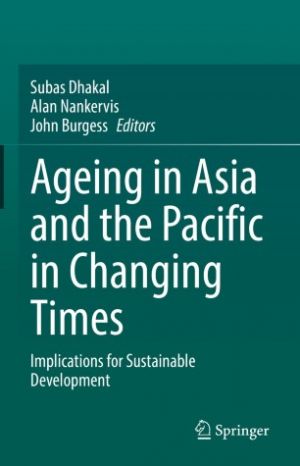Can our region manage ageing while still achieving sustainable development?
Numerically, most of the world’s population ageing over the next decades will be in developing nations, including in our own Asia Pacific region, with huge economic and social implications in areas such as workforce planning, migration and investment. The suitability of the United Nations’ Sustainable Development Goals (SDGs) as a framework for these countries to develop policies and strategies that also address ageing was explored in the launch of a new book, Ageing Asia and the Pacific in Changing Times – Implications for Sustainable Development in which CEPAR Chief Investigator Marian Baird and CEPAR researcher Alison Williams contributed a chapter on Australia.
The book launch and accompanying workshop to explore the challenges was hosted by Marian Baird at the University of Sydney Business School on 18 March 2022. Editors Subas Dhakal, Alan Nankervis & John Burgess, were joined by CEPAR Professor of Practice and Director of the Ageing Asia Research Hub, Pip O’Keefe, who provided the commentary. Other attendees included representatives from the Department of Employment, Skills and Education, CEPAR researchers, PhD students, post-docs and CEPAR Affiliates.
Research data into ageing in countries in the Asia Pacific region can be difficult to obtain and the SDGs are not a priority in the literature, the authors have found. There is very little on caregiving, human capital, sustainable development, and mortality, according to Dr Dhakal’s bibliometric analysis. More collaboration between researchers in developing and developed countries is called for – and Australian researchers are well placed to provide this, due to our proximity to the region.
Nonetheless, there are a number of challenges for translating research into policy in these developing countries, as Prof O’Keefe pointed out, including:
- the huge informal economy in the region that makes it difficult to collect high quality data
- the ability to create decent work in informal economies
- the lack of social protection systems
- the lack of budgetary provision for programs, and
- the existing cultural norms.
The book provides case studies of medium-sized and smaller developed economies (Australia, Malaysia, Singapore & Taiwan), and larger (China & India) and smaller (Bangladesh, Mauritius, Nepal & Thailand) developing nations, examining their ageing trends and policies and strategies – at government, organisational and local levels – that have been developed to address them. The workshop concluded with discussion of future research directions and potential collaborations.
Order the book: Ageing Asia and the Pacific in Changing Times – Implications for Sustainable Development


